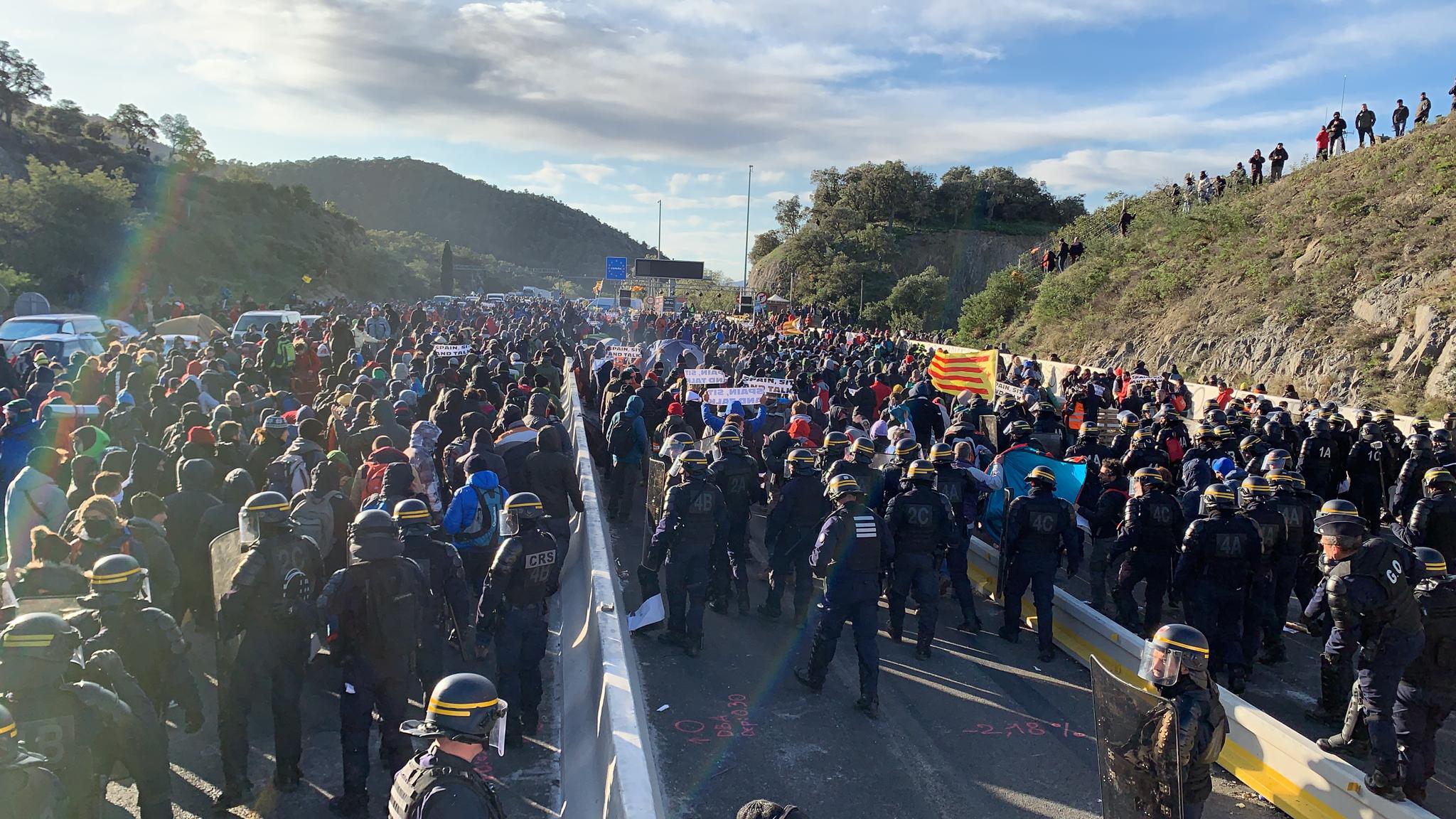A triumph for the right to demonstrate. Almost three years after an investigation was opened against 200 participants in a demonstration called by the Catalan pro-independence platform Tsunami Democràtic, the judge of a court of first instance in Figueres has closed the case against the protesters, accused of offences of public disorder for taking part in the blockage of the AP-7 motorway, close to where it crosses the Spanish-French border at La Jonquera, on November 11th and 12th, 2019, in a protest against the verdict in the Supreme Court trial of 12 Catalan leaders. The legal group Alerta Solidària, which conducted the defence for the majority of those investigated, announced the resolution this Thursday and affirmed that this closure of the case "is not a process of 'de-judicialization'", but rather that the judge "has adopted the opinion of the public prosecutor which is now paying attention to the jurisprudence of the Provincial Audience court of Girona and the European Court of Human Rights".
Last May, the judge asked the prosecutor if it was necessary to raise the case against a ERC deputy in the Spanish Congress, Marta Rosique, to the Supreme Court, as she had been identified in the protest and the response was that Rosique and the others present had not committed offences of disorder, as set out in the constitutional jurisprudence and that of the European Court of Human Rights (ECtHR) protecting the right to protest. With the decision of the Figueres judge, the case of most of the protesters who blocked the AP-7 motorway in November 2019 is closed, after last June, the Provincial Audience court of Girona already threw out the case against 49 people who allegedly blocked the AP- 7 near the town of Salt.
One resident and a police officer still under investigation
With regard to the case at La Jonquera, until now, judge Coscia had continued the investigation and had ordered police to arrest some of the protesters who did not appear in court, subsequently releasing them after their appearances. In today's resolution, the judge only maintains open the case against one person for an alleged offence of assault against a police officer, as well as another against a police officer for allegedly causing injury.
Prosecution claims that violence occurred
In its report to the court, the prosecution explains that the blockage of the AP-7 was massive and took place from the morning of November 11th and led to damage to the motorway to an estimated cost of 32,000 euros. It adds that the Mossos d'Esquadra estimated that overnight about 1,200 people remained on the highway and there were about 30 tents, and that they identified 108 vehicles and 196 people, and began to evict them, although it states that many participants had already left. According to the prosecutor's office, the protest on the AP-7 involved "a serious disturbance of public peace", by disrupting traffic circulation with effects on commercial and daily activity. The prosecution also claims that there was "violence [against] people and property".
However, the prosecution also presented recent jurisprudence that defends the right to protest. Specifically, it details the sentence of the Girona Provincial Audience precisely in which it confirms the dropping of charges against 49 people for the blockage of the AP-7 in Salt, against the opinion of the prosecutors. In that resolution, the Girona court emphasized that a multitude of people can be involved in a crime of disorder, and although it is not necessary to individualize what each person does, it is necessary to detail "what relevant contribution" they make in the criminal acts. "Who will attend a demonstration if their simple presence will be a sufficient basis for accusing them of all the crimes that might be committed?" asked the judges.
The prosecution also collects recent resolutions of the appeals chamber of the Catalan High Court (TSJC) on the crime of disorder, indicating that the actions of the participants must be individualized. Regarding the MP Marta Rosique, the prosecution details that she was identified when the protest was being evicted. Nothing more. And in the face of the jurisprudence presented, the prosecution affirms that neither disorder or any other offence can be attributed to the ERC deputy, and thus her case should not be sent to the Supreme Court, an opinion which the judge made his own, dismissing the case against her and the majority of the demonstrators.
More than 380 investigated
To demonstrate that the judicial persecution of Catalan independence activists has been very real, Alerta Solidària reports that in the motorway blockages closures in November 2019, there were 380 people investigated and ultimately not punished; as well as 9 minors who were verbally reprimanded while 48 people were investigated in processes that remain open, and one person is awaiting the setting of a trial date.

